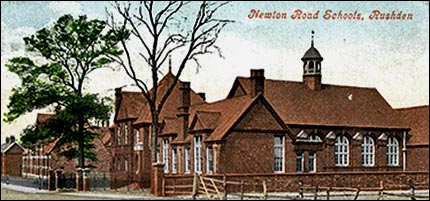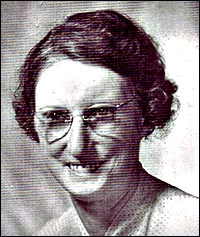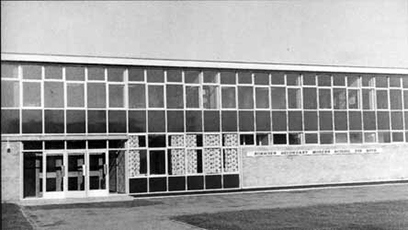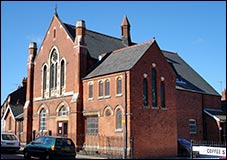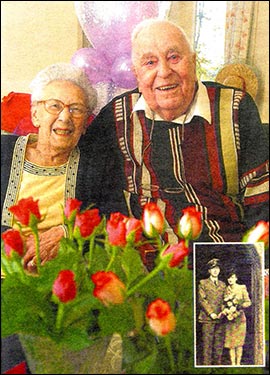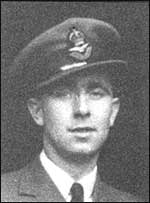|
|||||||||||||||||||
| From an interview with Rae Drage July 2008. Transcribed by Jacky Lawrence |
|||||||||||||||||||
|
Bert Catlin - a life in Education
|
|||||||||||||||||||
|
|
|||||||||||||||||||
|
|||||||||||||||||||
|
Now I was born in Rushden, I’m now officially, I shall be 87 years of age and I attended Newton Road Infants School. And as far as I can remember I was admitted, my birthday is on September 24th, I was admitted actually to that school when I was three years old, turning four three weeks after I started school. The infants’ school, as you all know, well you don’t know, was the school that joined Newton Road and Hove Road. And my first teacher there, the Infants’ School teacher, you had to go into the back door and you were never allowed, being so young, to go round in the main part in case you got knocked over.
I left the Infants’ School and went into the Junior School, which was next door, and the head teacher there was a Mr. Sadler, Samuel Sadler, Sammy of course we known him. Probably a semi bald headed bloke, lived up Wellingborough Road near the Mission Church somewhere he did. And my main teacher there after a Miss Winters was a Mr. Walter Dodge who took the 11 plus class and I took that 11 plus. As a result of that I went to the Grammar School at Wellingborough, prior to that of course, well, no, whilst that was going on, those that didn’t go to the Grammar School, but because it had probably the next level of intelligence, went to the Rushden Intermediate School, which in certain towns is called the Central School or Middle School i.e. middle between primary, grammar. And being in between the two I often think that the formation of that, as I’ve got older, Intermediate school in Rushden did an awful lot of harm to Rushden education. Now the reason I say that is that it didn’t allow some of the junior schools to celebrate, to develop I should say, to the degree which they could have done. All the better children were shunted off into the, it already had a group going off to grammar, the girls to the girls’ High. Then this other group, and indeed that Intermediate School brought in boys and girls from Raunds, Higham and Irthlingborough and whilst it competed in sport with the Rushden Schools, Alfred Street, South End, Newton Road, Higham Ferrers Junior, well we didn’t stand a chance as far as soccer and athletics were concerned because they had the, the better type of well, more physically developed children. I often remember my sister attended that school, she was four years older than me and I was very envious of her in that they had a first rate sports field at hand with a pavilion, a thing which was denied to us. Probably I shouldn’t say that I think it stood in the way of, I think it did. It was the headmaster, was a fellow called Perkins, amazing chap Perkins, he’s the only man I knew who could get a row of figures, of probably a list of figures thousands or more and he could add them up like that. I had to go up column by column, not him. I volunteered for the RAF when war broke out much to my father’s annoyance and also I’d applied to go to Durham University to study Geography. And I was accepted by the RAF but as I was going to University that year, the war broke out, they said I should go to University and part of my training in the RAF could be done at the Air Squadron attached to Durham University. Which was a good thing because when I went into the RAF, that was 1940/41, I went in as a LAC, Leading Aircraftsman, having done the first year’s training at the University as an Aircraftsman 1 and Aircraftsman 2. I had done all that and but I’d still got one or two year’s left to do my degree which obviously, God willing, I would go back after the War. Well I went into the RAF, trained as a Navigator in South Africa and came back to England and flew on bombers from Yorkshire, up in the North East, in Scotland. Flew on those, God was kind, I was one of the few that came through and I consider now that out of 150 thousand about 80 thousand of the bomber crew got shot down and what have you. And went back to University to complete my degree. In the meantime I’d got married during the War and so I’d met Pat at University at, she came from Durham. Peter my son had been born and we came back down from Rushden because obviously we were looking for a house where should we go to live. And my wife, we came to live with my mother whilst I went back to University for the year and she got, she was a trained teacher, and she got a job at the Tennyson Road Infants School which had been built in the mid 30s in Rushden the Tennyson Road Infants School. And my son attended a wartime nursery, which was just at, in a prefabricated shed, outside that school. Now it was in 1944 that the Baker Act came in which put the school leaving age up from 14 to 15 and that was implemented in Northamptonshire, I’m not exactly certain of the year around about 1946/47 time. And to take in the extra year group the 14 to 15 year olds they went to a school, a mixed school, 14 to 15 year old boys and girls in the Boot and Shoe School in Victoria Road. And the head of that school was a Lawrence, a Mr. Lawrence whose brother, Sid, Ron Lawrence that was his brother, Sid was head of Alfred Street Junior School. I came along and that school was, Mr. Ron Lawrence was head, Miss Boyes had come from the Girls’ School, which had been the old Intermediate School, had come up there to supervise the girls. And then I came along straight out of University as the third teacher. About a year later, while this was being done, whilst they built the prefabricated buildings to form Tennyson Road County Modern School, as it was called, which was being built to allow for the 15, the age going up to 15. Mr. Sid Lawrence died, Ron took over his job as head ,Miss Boyes became in charge, I became virtually the second, only one year out of college and a girl teacher Welsh girl teacher came along who was infant trained. Now when you consider then that secondary education started in Rushden with a girl, who was the head of the one of, the senior mistresses at the old Intermediate, me straight out of college and a junior trained Welsh girl. It was very strange there because we had no playground, we had to go in the street for playtime. And also if we wanted to do any physical education we went up to the Territorial Hall a little further up. Occasionally, I would take the boys for some outdoor physical education along the road, up Shirley Road where the railway bridge was, of the line that went to Higham and we did some few physical activities out in the countryside there. One day one teacher, I think it was the, the little girl from Wales, kept behind at lunchtime one girl, didn’t let her go home ‘til late and the father of this family was rather like my father. He said that everybody had to be at home ready so the whole family could sit down together. He was quite angry about this but somehow or other the girls went on strike for a day, rather interesting that. But eventually the buildings for Tennyson Road, for the boys’ section, were ready and we moved up there, 1949 that was it. And the girls went down to the Hayway School, the old Intermediate. That became the girls’ County Modern School and the one up at Tennyson Road there, why they called it Tennyson Road I haven’t, it was in Higham Hill Road not Tennyson Road. And we had four H.O.R.S.A. huts for the operation of the raising of the school age. There were three with two classrooms in each and the largest one had three classrooms. One classroom was large, one block two rooms, well one was a woodwork room, one was the metalwork room and the other two were all form rooms and the large room was the room for our assembly. There were about two hundred on roll. We took in all the children over eleven, apart from those who attended at Newton Road School. They kept theirs until they were thirteen and just sent on the final year for the year to 15 to that school. And then of course plans were made to build the new school.
The first head was a Mr. Sid Howett, who’d been the head of the Hayway School and he came up and took for one year. And the new head, he was appointed, was a fellow, Mr L. J. Wilce known as Jack. Lionel John Wilce was his name but L. J. Wilce took over as head in 1950 and about a year later I became his first assistant in there. The school and the staff we had, there was Jack, the head, there was me doing Geography and Games, Ron Williams from Higham doing Maths, a fellow called Liam Lamb for doing woodwork. A fellow, an American no, I’ve forgotten his name now, doing the metalwork and Husthwaite doing Science, he came from Wellingborough. That was about all the staff we had funny enough. Eventually, the actual little nursery room, which was certainly attended as a nursery as a baby, we took that over and that became the staff room and a bit of a school library that became. And Jack got the job, the head, as head of John Lee which was a superb built modern school to allow 15 plus in Wellingborough. He took that over and he said, why don’t you apply for the job here, which I duly did and got the job as head of the school. Now, if you wanted to attribute your success to your salary, which depended upon the size of the school, this success in life depends upon your salary going up. When I consider that I took over as head there was just about two hundred boys in that school, when I retired in 1980 we were up to one thousand four hundred boys. It had shot up enormously, our intake, well, which used to be about thirty a term, we were bringing in two hundred and thirty. A seven, eight class intake each, well, each year. We had seven classes there each time and that was like, when I left in, as I say in 1980. I’ve got to say that when it got to about the late seventies I don’t know if people remember Callaghan, the Labour, had been over in America and all our troubles were beginning to start financially. And he came back to us and said problems, what problems had we got and it was then that there was a series of financial problems in, you know, public monies and what have you and certain restrictions, as I remember, it seemed to be put upon schools. A lot of fun went out of the job, 'cos I loved the job and that was one reason why I retired from there rather earlier than I anticipated. I would have liked to have gone on until 65 but I retired when I was 60. Now as far as I can recall if anyone asked for the further development of that you came back and asked questions I can probably enlarge upon it but that were basically the history of my education.
My name is on the cradle roll in the babies’ section of the Mission Church but on Sundays, this is the reason I sort of got to detest it, Father was of the opinion that no lady knew how to make a feather bed. So, we all had to get up, my little sister hadn’t been born, but my older sister and myself got up early on Sunday morning whilst he made sure that all the beds were duly made and changed and what have you, he did the lot. Nobody could clean shoes like him and also when he’d cleaned all the shoes and put in a heap so we’d then got our own. And then we all had breakfast together, which was important so the family were at least sitting down to a meal together. We did all that then, had to leave the house at half past nine, walk from Oswald Road to the Mission Church for Sunday School which started at ten. That finished at ten minutes to eleven, my father was a Sunday School superintendent, he and some of the other senior men of the church then went out to have a smoke outside the church and I duly went out there and stood with them. Just before eleven, back in the church for the morning service taken by the Reverend E. Bromwich. Then, when he finished at twelve we walked back home to Oswald Road to have our midday meal. Well, it was a long walk, sat down and had that. No sooner had we finished this than, oh, I had to wear an apron having dinner so I didn’t spill anything on my best Sunday suit. No sooner had that finished, off came the apron and off we went back to Church again for the Sunday afternoon from two ‘til three. After that was over it was a walk with father down to Spencer Park where there was a wooden bandstand and a band playing and then a walk from there back up to Oswald Road. Tea, then Sunday night mother came to church, so about half past five we all got up and marched again, once again up to Wellingborough Road ‘til six ‘til seven. If it was going to be a light evening we had a walk from there up to see father’s garden field then back home. Do you wonder that I hated Sunday I seemed to spend the whole of my life in and out of an apron keeping everything clean. No wonder I was as fit as a fiddle the amount of walking I did. A fair bit of walking there and a crafty bloke, now I must tell you this before you go, he worked for the chap called Sale who funny enough was in this room before she died. And this bloke Sale, Saley he used to kid me. He’d say. ‘ Look I’m doing the gardening,’ he said. ‘I’ve just found this, a half crown piece in the,’ he said, ‘in the garden there,’ he said. ‘If you find one,’ he says, ‘you can have it.’ So he used to get me down there doing his weeding. I never did find half a crown but I weeded a lot of his peas for him.
|
|||||||||||||||||||
|
|
|||||||||||||||||||
|
|
